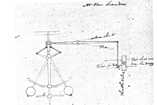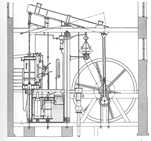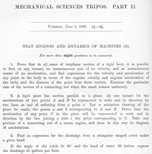
|
|
||||||||
The Development of Control Engineering in Britain
and the Cambridge Contribution
|
Historically, applications of feedback control date back to antiquity (e.g. Egyptian water clocks), though one of the most famous examples in technology is the centrifugal governor for steam engines invented by the Scottish engineer James Watt. It was this application that brought about the birth of control theory in a paper for the Royal Society of London by James Clerk Maxwell - a Scot, a Cambridge man, and perhaps most famous for his equations of electromagnetics. Another Cambridge man, who was contemporary with Maxwell, Edward J. Routh, was responsible for an important stability criterion which bears his name and which is taught in control courses all over the world to this day. Routh was one of the most famous and successful coaches at Cambridge in the 19th century, being a private tutor to more than six hundred pupils between 1855 and 1888, and preparing the Senior Wrangler (top mathematics student) on 27 occasions - an unparalleled feat. Routh was himself Senior Wrangler in 1854. |
|
| It seems that the stability analysis of governors and related mechanisms was taught from this time at Cambridge, at first in the Mathematical Tripos and later on in Mechanical Sciences (after the beginning of this tripos in 1894). See question 10 on the "Heat Engines and Dynamics of Machines" examination paper in the Cambridge Mechanical Sciences Tripos part II of 1897 shown here. Note that students were instructed to answer not more than eight such questions in three hours! |


